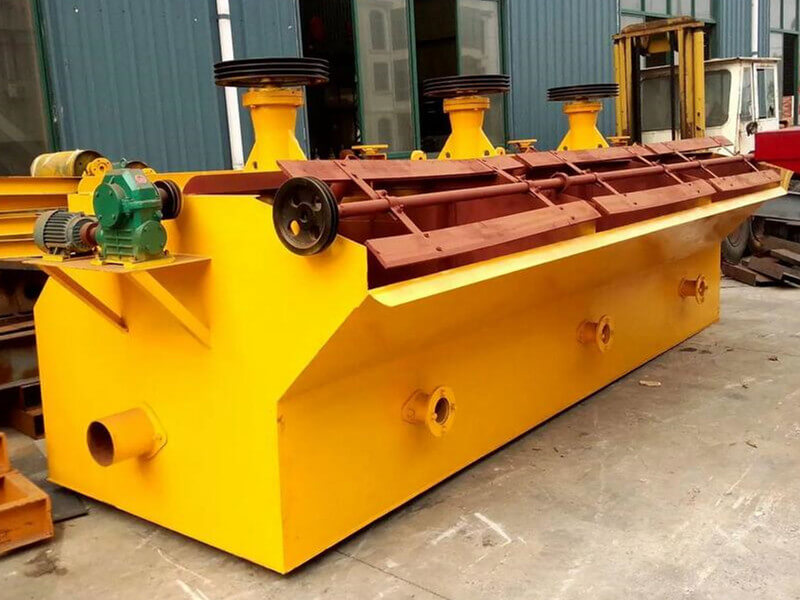Gold ore flotation is a complex process that involves various considerations and is influenced by several factors. In this article, we will discuss the important considerations and factors that can affect the efficiency and success of gold ore flotation.
Precautions for Gold Ore Flotation
Gold ore flotation extracts gold particles from ore by utilizing gold’s hydrophobicity and gangue minerals’ hydrophilicity. While the process can effectively recover gold, several precautions should be taken to ensure its success and safety. Here are some precautions for gold ore flotation.
Proper lab testing
Before implementing the flotation process on a larger scale, it is essential to conduct comprehensive laboratory testing to determine the optimal flotation conditions and reagent dosages. This helps ensure efficient gold recovery and minimizes the use of potentially harmful chemicals.
Safety equipment
Flotation can involve chemicals, so using appropriate personal protective equipment (PPE), such as gloves, goggles, and protective clothing, is crucial to avoid direct contact with hazardous substances.
Adequate ventilation
Flotation can release gases or fumes, depending on the chemicals used. Therefore, it is essential to have proper ventilation in the flotation area to prevent the buildup of potentially harmful vapors.
Dilution of chemicals
Flotation reagents can be hazardous if not handled properly. To minimize risks, they should be appropriately diluted and mixed before use. Follow the manufacturer’s instructions for safe handling and storage.
Avoiding environmental contamination
Flotation process water can contain residual reagents and other contaminants. Measures should be taken to prevent the discharge of contaminated water into the environment, and appropriate treatment processes should be implemented to ensure that the water is safe to release.
Equipment maintenance
Regular maintenance of flotation equipment is necessary to ensure optimal performance and reduce the risk of accidents or malfunctions.
Monitoring and control
Continuous monitoring of the flotation process parameters, such as pH, temperature, and froth level, is crucial to maintaining stable operation and maximizing gold recovery.
Minimizing turbulence
Excessive turbulence in the flotation cell can lead to decreased gold recovery and potential equipment damage. Proper design and operation of flotation cells can help minimize turbulence.
Controlling froth stability
The stability of the froth formed during the flotation process impacts gold recovery. Careful control of froth stability can improve the overall efficiency of the process.
Tailings management
Proper management of tailings is essential to prevent environmental contamination. Tailings should be stored in secure facilities and managed in accordance with local regulations and best practices.
Remember that the specific precautions may vary depending on the type of gold ore, the flotation process used, and the equipment and chemicals involved. Always consult with experts and adhere to safety guidelines and regulations to ensure safe and effective gold ore flotation.

Factors Affecting The Gold Flotation
Gold flotation is influenced by various factors that can impact the efficiency and effectiveness of the flotation process. Understanding these factors is crucial for optimizing gold recovery. Here are the key factors affecting gold flotation.
Ore mineralogy
The mineral composition of the gold ore, including the type of gold minerals and associated gangue minerals, can significantly affect the flotation process. Some minerals may be more easily floated, while others require specific reagents for effective separation.
Particle size
The size of gold particles in the ore can influence flotation performance. Fine-grained gold may be more challenging to recover due to its lower settling rate and increased surface area, whereas coarse gold particles can float easily.
pH level
The pH level of the flotation pulp plays a critical role in gold flotation. It can affect the chemistry of the flotation reagents and the hydrophobicity of gold and gangue minerals. Generally, a neutral to slightly alkaline pH range is preferred for gold flotation.
Flotation reagents
The choice and dosage of flotation reagents, such as collectors, frothers, and modifiers, are vital for selectively separating gold from gangue minerals. The proper selection and optimization of reagents are essential for maximizing gold recovery.
Pulp density
The concentration of solids in the flotation pulp affects the kinetics of flotation. Too high or low pulp density can reduce flotation efficiency and gold recovery.
Flotation equipment
The design and characteristics of the flotation cell or machine can impact the flotation process. Agitation speed, cell geometry, and bubble size distribution can influence flotation performance.
Water quality
The quality of water used in the flotation process can impact the stability of froths and flotation efficiency. Contaminants or impurities in water may interfere with the flotation process or affect the performance of flotation reagents.
Flotation time
The duration of flotation can influence the recovery of gold. Insufficient flotation time may result in incomplete recovery, while excessive flotation time can lead to over-flotation and reduced selectivity.
Temperature
Flotation kinetics can be influenced by temperature. In some cases, increasing the temperature can enhance the flotation rate and recovery of gold.
Flotation circuit configuration
The circuit’s arrangement and sequence of flotation cells can impact the overall performance. Using rougher, scavenger, and cleaner stages can optimize gold recovery.
Presence of impurities
Certain impurities in the ore, such as sulfides, can affect the flotation process and may require additional treatments or modifications to achieve efficient gold recovery.
Operator skills and experience
The flotation operators’ knowledge and expertise can significantly impact the process’s success. Proper control and adjustment of process parameters require skilled personnel.
By carefully considering these factors and optimizing the flotation process, it is possible to improve the efficiency and yield of gold ore flotation. Regular monitoring and adjustment of process parameters are essential for achieving consistent results.
